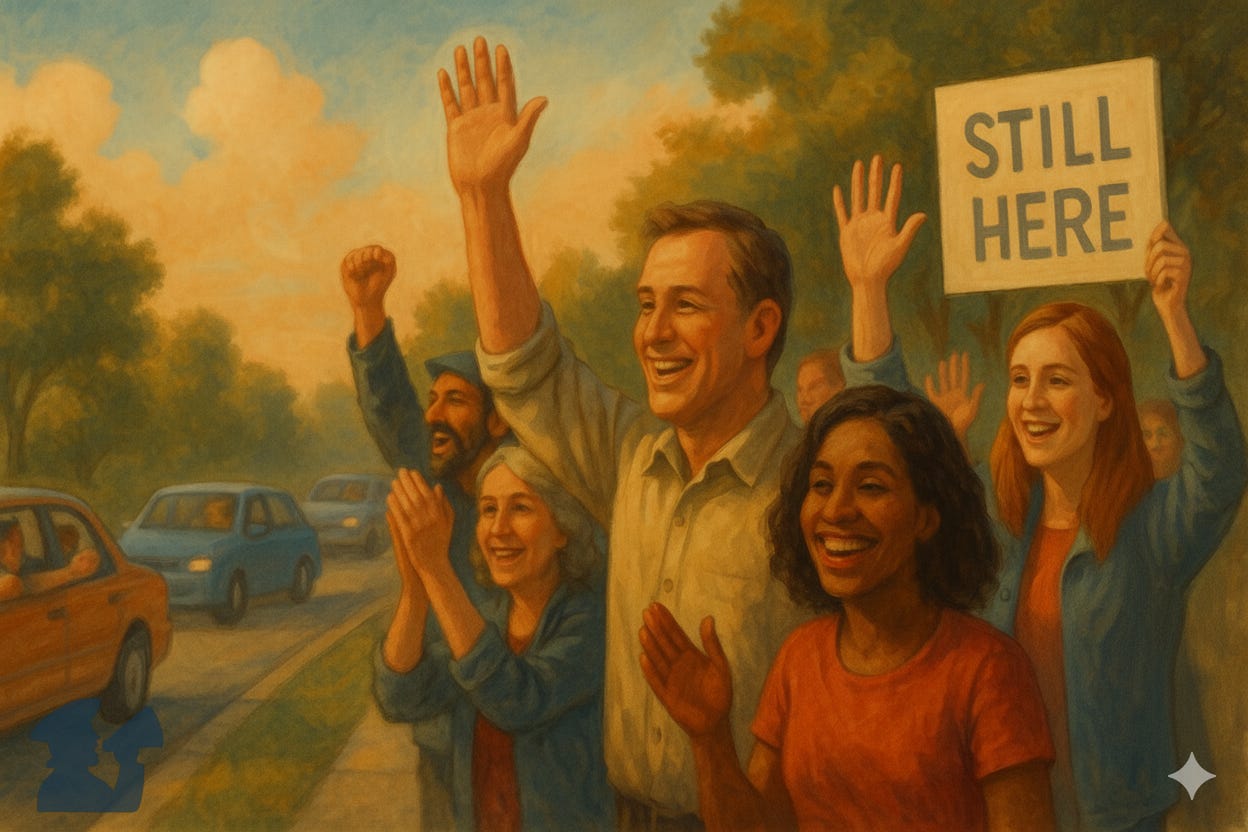Play With Joy...Even When the World’s on Fire
Joy and solidarity are powerful acts of resistance, especially in community.
Hello, y’all!
As always, I’m looking forward to seeing all you happy advocates on Saturday. The forecast has another beautiful day dialed up for us with sun and mid-seventy temps.
Newly-Minted Patriots
For those of you who are new to our community, welcome! We are excited and grateful you found us.
If you haven’t yet subscribed to Southwest Crier, please do so now. The welcome email you get will provide all the logistics about our weekly pro-democracy rallies.
Play With Joy
Rebecca recommended this article, Joy as Resistance, last month. It really touched my heart because joy is central to who I am.
I organized a weekly touch football game for about twenty years until (sadly) the pandemic put an end to that.
Those games provided me a great deal of joy. The camaraderie with the guys. The athletic competition. The psychology of managing different personalities. So much fun!
One of my buddies would occasionally have a snarl on his lips and I’d have to remind him, play with joy! It’s a game. The whole point is to have fun.
My all-time favorite work of music is Beethoven’s 9th symphony, the last movement of which is titled “Ode to Joy.” The phrase “plays with joy” is in my bio on Threads.
This is a long way of saying that “play with joy” has pretty much been my official motto throughout my life.
I encourage you to read the whole article but I’ll include this brief passage that captures the essence of Sharon McMahon’s argument:
how can people create joy when surrounded by suffering? Viktor Frankl, Holocaust survivor and author of Man’s Search for Meaning, offers a vital perspective. He observed that even when life is stripped to its barest essentials, individuals have the freedom to choose their response. “Everything can be taken from a man but one thing: the last of the human freedoms — to choose one’s attitude in any given set of circumstances.” Frankl illuminates why, across history, individuals and communities have sought brief moments of happiness even under extreme threat. It is not escapism, but an assertion of agency, the choice to find meaning and persevere amid suffering.
It is an important reminder that enjoying those things that give us joy is both healthy, despite the grim state of the world, but also a deliberate act of control and defiance.
We will not allow the forces of division to dictate or disrupt our moments of joy.
Since about 2014, I have been mostly holding it all inside while my interior dialogue is screaming Why aren’t you all seeing this?!? And like all of you, I have been grieving for what has happened to the country we love.
But finding you all gave me joy because it gave me hope because when we are together, hope is not lost.
As the cars pass each Saturday, pay special attention to those people honking, giving us the thumbs-up, clapping, and pumping their fists in the air.
Look at their faces.
Let’s continue to spread hope and joy. For as long as it takes.
The Paper Clip Protest
One of you pointed me to a Joyce Vance article where she discusses the Paper Clip Protest.
The paper clip protest during World War II was a powerful, non-violent act of resistance carried out by Norwegians after the Nazi occupation of their country. In 1940, following the German invasion, Norwegian citizens began wearing paper clips on their lapels as a subtle but potent symbol of solidarity and opposition to the Nazi regime.
The choice of the paper clip was deeply symbolic. The Norwegian word for a paper clip is “binder,” a name that cleverly expressed that they were “bound together” in their resistance. It also served as a display of national pride, as many Norwegians incorrectly believed the device had been invented by a countryman, Johan Vaaler.
As the protest spread, Nazi occupiers eventually understood the meaning behind the seemingly innocuous paper clips. The act of wearing one was soon made a crime, and those who continued to do so faced arrest and even imprisonment.
The paper clip protest was one of many forms of civilian resistance in Norway, including widespread teacher resignations in protest of forced Nazi indoctrination in schools.
The quiet solidarity symbolized by the paper clip ultimately contributed to the sustained, non-violent resistance movement against the Nazi occupation.
No Kings Social Media Kit
Help spread the word with our No Kings Social Media kit.




Nice work on the weekly SW Crier, Dave.
Many of you I am sure have read Robert Hubble. He has a daily newsletter that is optimistic about the future of this country. He knows the art of protesting and had all activists backs. I find it uplifting every morning. He may be an optimist but he knows the reality of the current corrupt administration and helps to clarify the many, many distractions thrown at us daily. If you haven't read his daily diaries, I recommend them.
I needed this reminder!!!